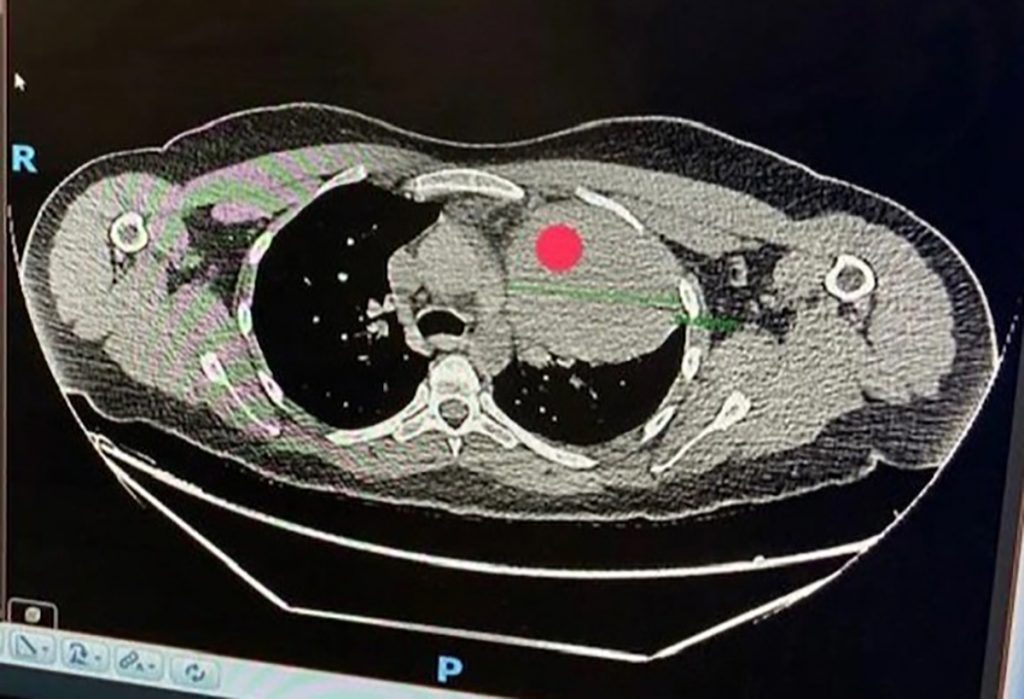What Kind of Cancer is Sarcoma?
- A woman has eight tumors and was recently diagnosed with synovial sarcoma after her doctors ignored her symptoms for more than five years.
- Sarcomas are cancers that arise from the cells that hold the body together. They can occur in muscles, nerves, bones, fat, tendons, cartilage or other forms of connective tissues.
- A synovial sarcoma is a rare cancer that can come from different types of soft tissue, such as muscle or ligaments. This type of sarcoma accounts for 5% to 10% of soft-tissue tumors.
"I spent years going to different doctors and specialists because I knew in my gut that something was wrong," Joanna Georgiou tells The Sun.
Read MoreJoanna's Diagnosis
She first felt a small lump on her knee about five years ago, which prompted her to visit her primary care doctor, but she was reassured that the lump was "nothing but a cyst." She was given some ibuprofen for the pain and sent home.
The pain kept getting worse; over the years, she returned to several different doctors, who prescribed her painkillers. In August, her pain became unbearable, which prompted her to visit a private surgeon. She tells The Sun that she couldn't afford the appointment, but she went anyway as she "knew in her gut" that something wasn't right.
They always say to trust your gut, and Georgiou's gut was right, as the doctor diagnosed her with stage four synovial sarcoma, a rare type of cancer that forms in soft tissue. In total, she now has eight tumors, one the size of a tangerine next to her heart. She has six smaller tumors in her lungs, and a large tumor in her knee.
So far, Georgiou says she’s had four rounds of chemotherapy, she's lost her hair and she may even have to have her leg amputated in order to save her life. And despite her treatment, her lung tumors have remained the same in size and her knee tumor has changed shape, but remained the same in size as well.

However, the tumor near her heart has shrunk; it started off as 9 centimeters and is now 3.5 centimeters in size. She says that while tumor shrinkage may sound like good news, it "overall really doesn't have that big of an impact on my prognosis."
"Going forward I have some big decisions to make. I can continue radiotherapy and prolong my life as much as I can," she adds. "I keep hearing this phrase 'prolong my life,' and I don't want to prolong my life. I want to live my life, so I am considering surgery."
"The doctors believe they can remove the tumor from my chest and I would have to have my leg amputated, as there's no other way to get rid of that tumor. It would be a long road to recovery, but I am a stubborn person, and I won't give up that easily."
What Kind of Cancer is Sarcoma?
Sarcomas are cancers that arise from the cells that hold the body together. They can occur in muscles, nerves, bones, fat, tendons, cartilage or other forms of connective tissues.
"There are hundreds of different kinds of sarcomas, which come from different kinds of cells," Dr. George Demetri, director of the Sarcoma and Bone Oncology Center at Dana-Farber Cancer Institute and Harvard Medical School, tells SurvivorNet.
Related: What Are Sarcomas? Know the Types and Symptoms of These Rare Cancers
A synovial sarcoma the sarcoma cancer Georgiou has is a rare cancer that can come from different types of soft tissue, such as muscle or ligaments, according to the National Cancer Institute. This type of sarcoma accounts for 5% to 10% of soft-tissue tumors. (For every one million people, one to two are diagnosed with synovial sarcoma every year in the United States.) It's often found in the arm, leg or foot, and near joints such as the wrist or ankle. It can also form in soft tissues in the lung or abdomen. (Synovial sarcoma may also be called malignant synovioma.)
The main symptom of synovial sarcoma is a slow-growing, painless mass, which is why it's so difficult for many to detect. This is a symptom Georgiou clearly exhibited as she had a lump growing in her knee for some time.
"Unfortunately, most sarcomas don't cause many of the symptoms that may be associated with other cancers," Dr. Dale Shepard, director of the Cleveland Clinic Taussig Cancer Institute Phase I and Sarcoma Programs, tells SurvivorNet. Shepard also explains that this often leads to large tumors at the time of diagnosis.
"Soft tissue sarcomas are typically painless," he says. "Bone sarcomas may be mistaken for orthopedic injuries. A mass the size of a golf ball or larger and growing should be evaluated as a potential sarcoma. It's important that patients who do have symptoms are not dismissive of them."
Contributing: Chris Spargo
Learn more about SurvivorNet's rigorous medical review process.


